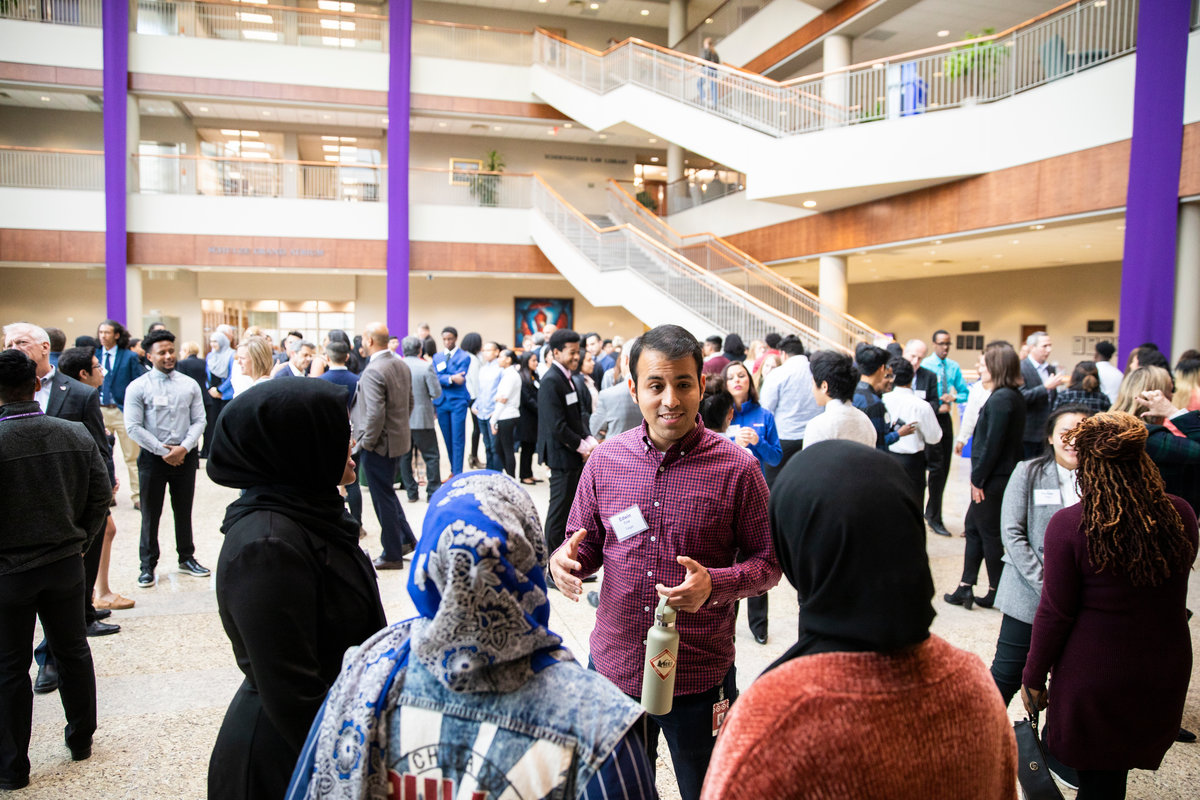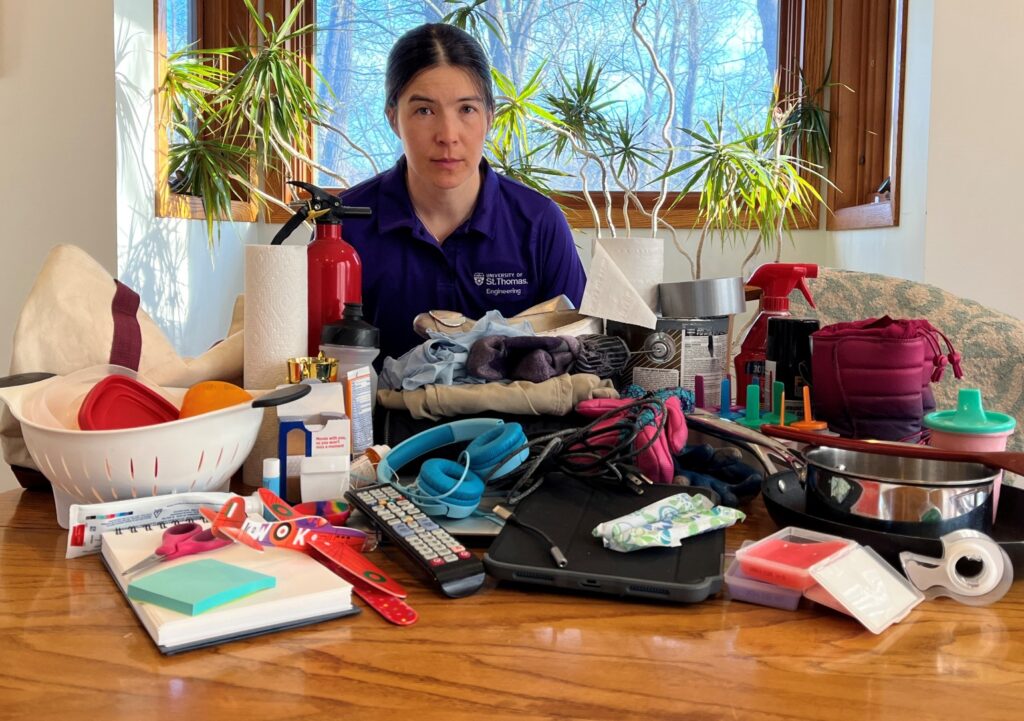College is crucial for a student's future academic and career success. However, college is a luxury most students cannot afford, especially those affected by intergenerational poverty. In response, the Dougherty Family College (DFC) at St. Thomas aims to help scholars break this cycle, which it has been doing for almost five years now.
And, donors are stepping up to support students. DFC has raised approximately $34 million through philanthropic contributions. Its goal is to reach $50 million by 2027.
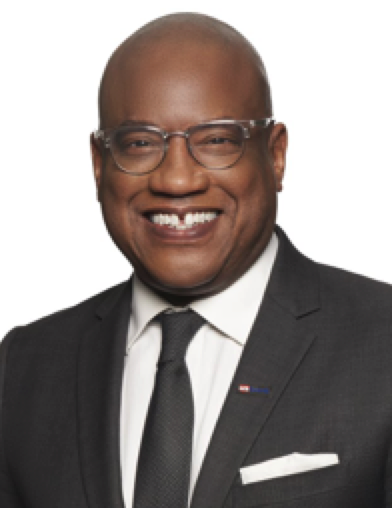
Greg Cunningham, U.S. Bank chief diversity officer. (Image courtesy U.S. Bank)
“Supporting DFC has given us an opportunity to cultivate future leaders and build an incredible pipeline to important new talent,” said Greg Cunningham, senior vice president and chief diversity officer at U.S. Bank, which gives financially and through internships to the students.
Quoted in a DFC brochure, Cunningham said: “When I was first introduced to the Dougherty Family College program and met the young adults who were part of it, I actually saw myself in their faces. I saw the same hope that I had at their age; hope that someone would believe in me and my potential.”
DFC is a two-year college helping students to earn an associate degree with scholarships funded by generous donors. Approximately 73% of the attendees are the first in their families to attend college, according to DFC data.
Students attending DFC experience a smooth transition to a four-year university with financial and career assistance from the college.
Its mission resonates with its leader personally.
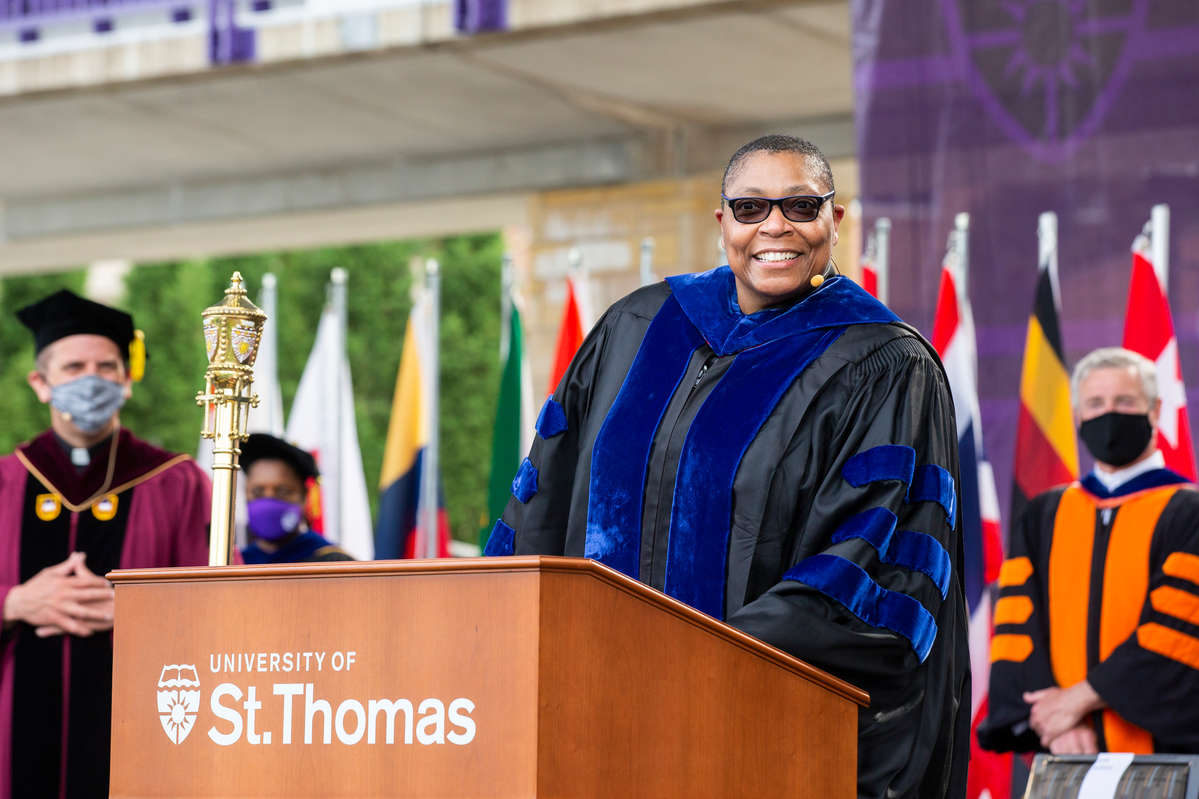
Interim Dean of the Dougherty Family College Buffy Smith speaks to students during the Dougherty Family College 2021 commencement ceremony. Liam James Doyle/University of St. Thomas
Buffy Smith, interim dean of DFC and a sociology professor, understands the importance of education and the need for talented students to obtain financial assistance and other academic support if that’s the barrier to them attending college.
“I wouldn’t have the opportunity I have now,” she said, if it weren’t for Marquette University’s Educational Opportunity Program. The helping hand she received assisted her in earning her bachelor’s degree, master’s degree and PhD.
She said it’s the business of all educational institutions across the nation to open opportunities to all students, especially underrepresented students. That’s why the purpose of DFC is to help these students gain the education they desire.
“I’ve seen what the power of education can do just in my own family,” Smith said. “That is a pathway you want all young people to experience.”
When it comes to education disparities, Minnesota finds itself near the bottom. According to a report by the Federal Reserve Bank of Minneapolis, Minnesota is observed as “one of the worst states in the country for education achievement gaps.”
 The educational disparities go far beyond race, including issues of socioeconomic status and geography. The report examines achievement gaps evident in standardized test scores, graduation rates, and college readiness indicators. DFC’s mission is to prepare students and help them overcome financial barriers in order to earn a bachelor’s degree, thus assisting in closing the substantial achievement gap.
The educational disparities go far beyond race, including issues of socioeconomic status and geography. The report examines achievement gaps evident in standardized test scores, graduation rates, and college readiness indicators. DFC’s mission is to prepare students and help them overcome financial barriers in order to earn a bachelor’s degree, thus assisting in closing the substantial achievement gap.
Students attending DFC demonstrate high financial need. Smith said that due to the generous financial support they receive from numerous donors, the scholars enrolled in the college pay, on average, $2,700 a year. The school covers the cost of student textbooks, meals, laptops, and provides transportation. More than half of our students pay a little over $1,000 a year. This allows students to focus on their studies without the weight of worrying about finances, Smith said.
Making a private college accessible to underrepresented students wouldn’t be possible without donors. Donor partnerships with DFC include, but aren’t limited to, leaders at major companies, such as U.S. Bank, Target and Mayo Clinic.
“It’s not enough to just give money,” said Cunningham. “You have to be intentional about how you support and how you lift young people up.”
Along with giving crucial direct funding to the college, the donors also provide paid internships for the students.
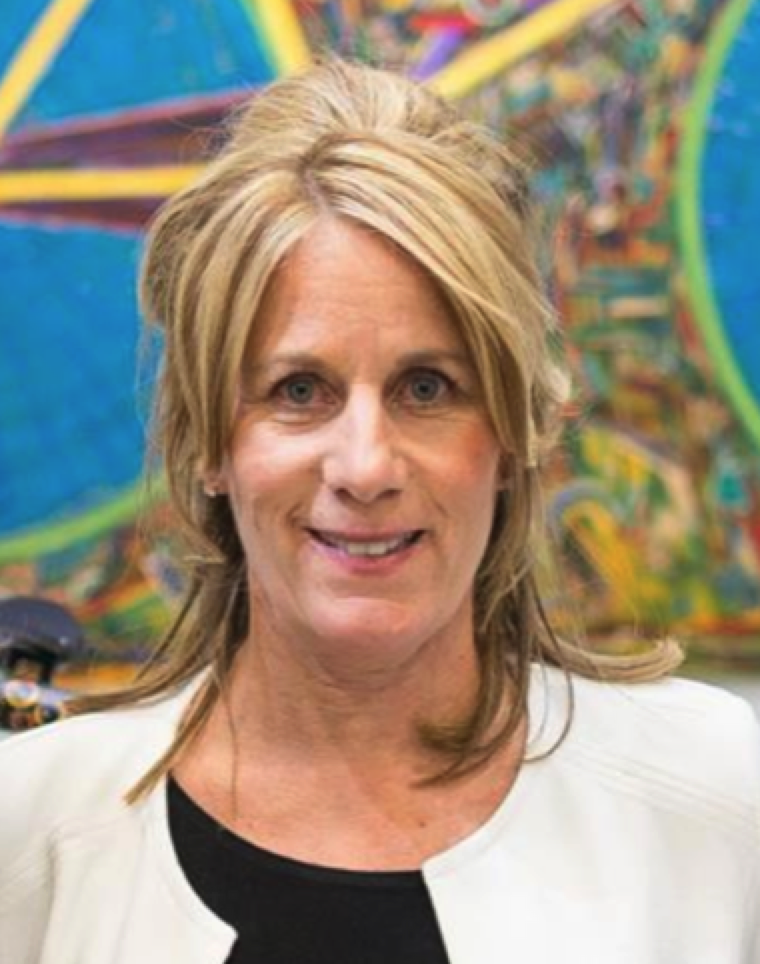
Anne Hed, CEO of HED Cycling
Donors also contributed to an emergency fund so that DFC can provide extra financial assistance to the students in times of need, such as the pandemic.
Anne Hed, the co-founder and owner of HED Cycling, was a first-time donor to DFC for the 2020-21 academic year. A percentage of the money made from a Cyber Monday sale was donated to DFC; she then matched that out of pocket.
Hed first became aware of DFC when she coincidentally met the college’s co-founder, Kathy Dougherty, on an airplane. One conversation led to another, and Hed ended up meeting with Dougherty’s husband Mike, also a co-founder, to learn more about the college. She resonated with the mission of the college and felt that they matched with her own company’s core values.
Hed wants everyone to have the opportunity to attend college.
“It teaches you so many aspects of the beginning of your steps in life,” she said.
She hopes to see DFC continue to grow and raise more students to be future leaders.
“To break the cycles of intergenerational poverty, education still remains that critical pathway,'' said Smith. She’s eager to see DFC become the college known for empowering future generations.
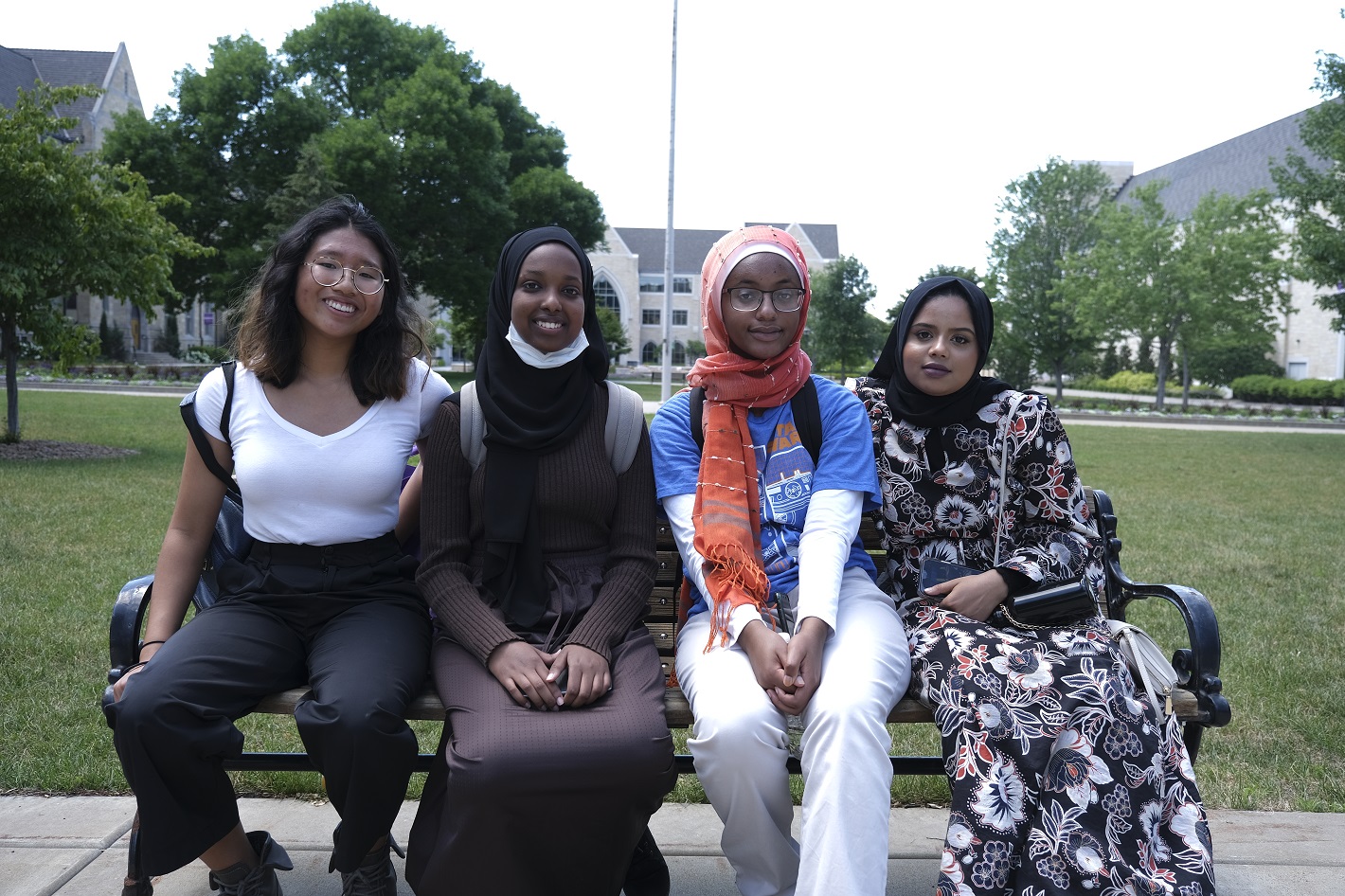
The authors are ThreeSixty reporters (l-r) Maneeya Leung, Ilhaan Dhegadub, Faaya Adem and Ariana Yasmin. They created a storytelling campaign about the Dougherty Family College at ThreeSixty Journalism’s Emerging Media Workshop, held summer 2021 on the St. Thomas campus. (Dymanh Chhoun/ThreeSixty Journalism)
